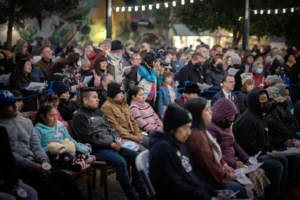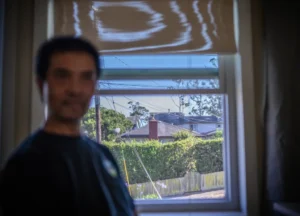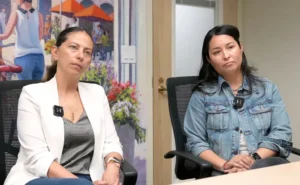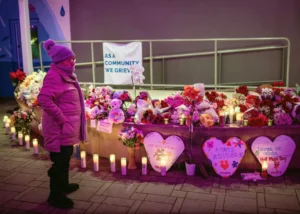
Por Peter Schurmann, Video y Fotos por Manuel Ortiz.
Half Moon Bay, CA. – El Sr. Huang vive en un apartamento modesto de una habitación junto a la autopista 1, a unas pocas millas de la ciudad de Half Moon Bay. Originario de Hong Kong, se para en la puerta principal para dar la bienvenida al grupo de proveedores de apoyo que llegan para una de sus visitas regulares.
Antes de enero, Huang y un puñado de otros trabajadores agrícolas chinos aquí eran tan invisibles que pocos en esta comunidad costera, por lo demás muy unida, sabían siquiera que existían.
«Somos como peces dorados en una pecera», dijo el Sr. Huang ‒pidiendo que solo usemos su apellido‒, hablando en cantonés a través de un traductor. «Nadamos dando vueltas y vueltas, sin conexión con el exterior».

Ese aislamiento casi total se hizo añicos el 23 de enero, cuando Chunli Zhao, de 66 años, abrió fuego en California Terra Garden, donde vivía y todavía trabaja Wang, y en otra granja, matando a siete. Las muertes se produjeron pocos días después de otro tiroteo masivo en el sur de California ‒el perpetrador en ese caso también era un hombre asiático mayor‒ y justo después del Año Nuevo Lunar, una época típica de celebraciones y reuniones familiares.
Más de seis meses después, una media docena de trabajadores agrícolas chinos afectados por el tiroteo permanecen bajo una nube de incertidumbre sobre su vivienda y empleo a largo plazo. Todos dicen que las imágenes de esa noche continúan persiguiéndolos.
«Tengo muchas pesadillas», dice el Sr. Liu, de 65 años, sentado junto a su esposa en una casa adosada de alquiler a unas pocas millas de la ciudad. Ambos vivían y todavía trabajan en Concord Farms, la segunda de las dos granjas impactadas esa noche, y estaban allí la noche del tiroteo. «Me despierto por la noche y estoy muy alerta».
La pareja, originaria de la provincia china de Shaanxi, llegó por primera vez a la granja de Half Moon Bay en 2006. Se enteraron del trabajo a través de un anuncio en un periódico local chino mientras se hospedaban con un pariente. ‒Los propietarios de ambas granjas involucradas en el tiroteo son chino-estadounidenses‒.
La Sra. Liu dice que cuando llegaron por primera vez a la granja, le preocupaban las condiciones de la vivienda y los bajos salarios, pero agrega que estaban agradecidos de tener un empleo y un techo. «El lugar estaba húmedo y húmedo, con moho. Me preocupaba la salud de mi esposo». Pero agrega: «Estar aquí en los EE. UU. es mucho mejor para nosotros. Podemos ganar dinero y mantener a nuestros familiares en China».
Los cinco trabajadores agrícolas chinos entrevistados para esta historia dicen que regresaron a trabajar casi inmediatamente después del tiroteo, en gran parte por necesidad financiera. Pero según el Sr. Liu, esas horas después del trabajo, sentado en su nuevo hogar temporal sin nada que lo distraiga, son las más difíciles. «Todavía veo sus rostros», dice de aquellos con los que pasó años trabajando.
Cinco de las siete víctimas asesinadas esa noche eran chinos, la mayoría de ellos ancianos como los Liu. El contacto con los familiares ha sido esporádico, con pocos o ningún detalle disponible sobre quiénes eran las víctimas, lo que significa que sus muertes, al igual que las vidas que llevaron en la granja, permanecen en la oscuridad.
Uno de los asesinados fue Jingzhi Lu, de 64 años. Las comidas que preparaba en la finca ofrecían un punto de contacto nocturno entre los trabajadores agrícolas, en su mayoría latinos, y el pequeño grupo de chinos, según Enrique Bazán, de la organización sin fines de lucro Ayudando Latinos a Soñar ‒ALAS‒. «Mamá Lu, la llamaron», dice Bazán, refiriéndose al grupo de niños de 4 a 6 años que participan en una sesión semanal de terapia grupal organizada por ALAS. Todavía preguntan por ella.

Karen Decker es la administradora de vitalidad económica y comunitaria de Half Moon Bay. Ella dice que en los días posteriores al tiroteo, los trabajadores agrícolas chinos dudaron en acercarse o participar en un memorial organizado por la ciudad. «Tenían miedo de una reacción violenta», señala, señalando el origen étnico del sospechoso y la ola de ataques en curso contra los estadounidenses de origen asiático.
Conectar al grupo con los servicios de apoyo también resultó desalentador inmediatamente después, agrega Decker, quien es birracial y ella misma es miembro de la comunidad de isleños asiáticos del Pacífico. Los funcionarios de la ciudad recurrieron rápidamente a un puñado de organizaciones sin fines de lucro en las cercanías de San Francisco, incluidas Chinese for Affirmative Action, Self Help for the Elderly y Chinatown Community Youth Center, cuyos esfuerzos fueron clave para establecer una línea abierta de comunicación y confianza.
Pero, dice Decker, el costo del tiroteo en los sobrevivientes se ha profundizado con el tiempo.
«A medida que los días se convierten en semanas y meses, veo dificultades en algunos de nuestros sobrevivientes en cuanto a cómo pueden afrontar una tragedia como esta», explica. «Porque después del funeral, después de que los cuerpos fueron repatriados a sus países de origen, después de que los medios se fueron, ahí es cuando realmente comienza a establecerse… No hay vuelta atrás».

Ambas granjas fueron multadas recientemente por violaciones federales de salud y seguridad, alimentando la ansiedad entre los sobrevivientes de que las granjas puedan cerrar y dejarlos desempleados y potencialmente sin vivienda.
Los 40 hogares afectados por el tiroteo, que sigue siendo una investigación abierta, se alojaron inicialmente en un hotel local y luego se ubicaron en unidades individuales de Airbnb antes de trasladarse a alquileres temporales pagados por el condado de San Mateo hasta principios del próximo año.
Hay planes en marcha para construir viviendas más permanentes para los trabajadores agrícolas mayores, aunque en el mercado inmobiliario notoriamente caro del Área de la Bahía, será difícil hacerlo rápido y por debajo del costo.
La oficina del gobernador Newsom anunció en junio que proporcionaría 16 millones de dólares para apoyar la propiedad de viviendas para los trabajadores agrícolas en el estado, incluidos 5 millones reservados para los sobrevivientes del tiroteo en Half Moon Bay. Pero eso sigue siendo una gota en el océano en un área donde los precios promedio de las viviendas se acercan a los 2 millones.
«Tenemos una emergencia de vivienda», dice el administrador de la ciudad de Half Moon Bay, Matthew Chidester. «Simplemente no hay lugares para que vivan estas personas. Estamos aprovechando el dinero y la tierra del estado… y estamos tratando de hacer este desarrollo rápido para construir una comunidad agradable para que vivan en el futuro».
Mientras tanto, este pequeño grupo de trabajadores agrícolas chinos, incluido el cónyuge del tirador, deben reflexionar sobre un futuro incierto en esta idílica ciudad costera que todos dicen que aprecian, a pesar del aislamiento.
«Es hermoso», concuerda el Sr. Huang, quien ha trabajado aquí en la granja durante casi dos décadas.
«Luego recuerda la primera vez que se encontró con otro hablante de chino en una cafetería local ‒el Sr. Huang se describe a sí mismo como un amante del café‒. «Estaba tan feliz», dice, «solo de poder hablar con alguien».
Este es el primero de una serie de informes de EMS y Península 360 Press que analizan los impactos a largo plazo del tiroteo masivo del 23 de enero en Half Moon Bay, en asociación con el Instituto Vincent Chin.
Te puede interesar: Migrantes viven situaciones inhumanas en su lucha por buscar el «sueño americano»

